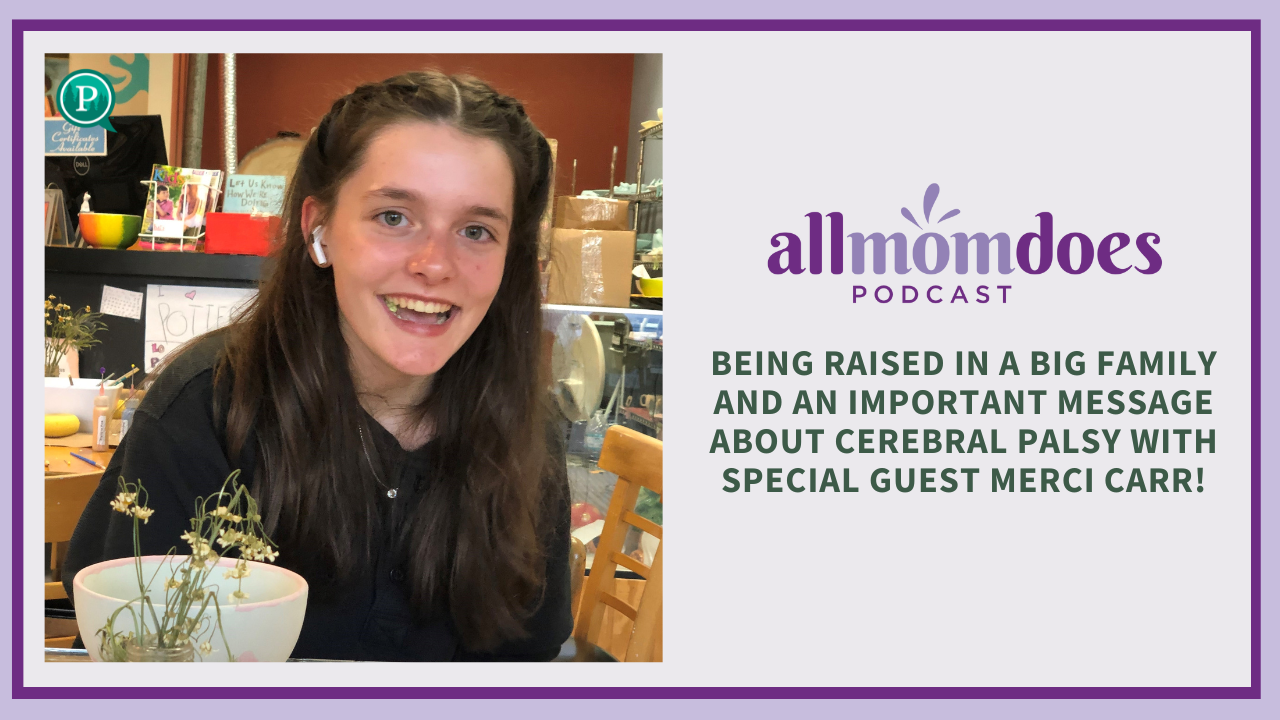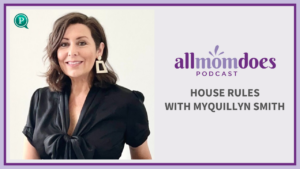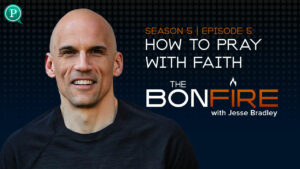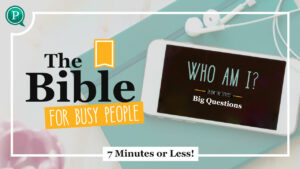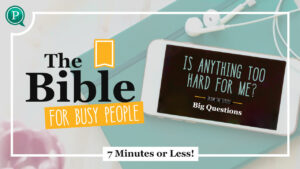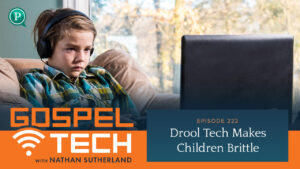It’s a first! One of Julie’s daughters, Merci, is on The AllMomDoes Podcast with some hilarious insights on being raised in a big family, along with an important message about cerebral palsy and being differently abled.
Show Notes:
March 25, 2023 is Cerebral Palsy Awareness Day!
Get your CPA t-shirt here!
Find Julie: Online | Instagram | Facebook | Twitter | Pinterest
AllMomDoes: Instagram | Facebook | Twitter
Transcription:
Purposely your life, God’s purpose. Listen at onpurposely.com.
Julie [00:00:15] Today on the All Mom Does podcast, I have one of my very favorite people in the world. And you know, maybe it’s because I. I birthed her. This is an All Mom Does podcast first. Here we are in our sixth season and this is the first time I’m going to have one of my kids on Merci Carr. How does that make you feel getting to be the first one?
Merci [00:00:38] I feel great. I feel very special.
Julie [00:00:40] Very, very special. Okay, so, listener, here’s the deal. Merci is my seventh child. She’s going to be 16 soon. She is one of a set of twins. They are the only twins that I had in all of the eight. And she and her twin Jakin are the last two. So Merci’s number seven and Jake is number eight. So while Mercy is not technically the baby, she is the baby girl. And I got to be honest, Merci, I feel like that is something that you hold very dear, that you’re the baby girl.
Merci [00:01:12] I do. Hold it very dear. I do.
Julie [00:01:15] As one of five girls, I do think that that is a special position that you get to hold within the family. So. Well, listener the reason I wanted to have Merci on today is if you’ve read my book, Raising an Original, if you’ve listened to some other podcast episodes, you may be aware that when Merci was born, we had a little something happen and it is something that she’s probably going to carry for most of her life and does so with an incredible amount of grace and wisdom and wit and dark humor and all the rest. And so we’re going to dive into that here in a little bit. But first, I thought maybe you might want to hear from Merci what it’s like to be raised in a family of eight kids. So Merci, what is your experience being part of a really big family in a culture today that doesn’t often have a lot of big families of this size around?
Merci [00:02:03] It’s very interesting because people, people would hear that I have such a big family and their immediate reaction is like, “What’s that like?” And I’m like, “I have no idea because it’s literally all I’ve known.” Because all my siblings, they kind of experience like the normal family size, but I’m one of the last. So it’s quite literally all that I’ve known. But seeing our family versus other people, I will say is definitely different. It’s definitely very chaotic Christmas time. Oh, man. Christmastime is wild because everybody just comes home and we realize how small the house feels when everybody’s back. Because since it’s just been me and my older sister, my older brother here four of the kids and not eight of the kids, our house has actually started to fit us all. But when everybody comes back, feels like the walls are closing in a little bit.
Julie [00:03:04] Yeah, absolutely. I completely resonate with that. I don’t know exactly how all eight of the kids and your dad and I were in this house all together for the period of time that we were. Because when everybody comes home to visit or even if just a couple of your older siblings come home to visit, it does feel like we are about to blow out the sidewalls. I just don’t quite know how that all worked. I know it did. I just don’t remember quite how. So I want to ask you to what your experience is like being a twin. So not only are you part of a really big family, you also have an interesting experience and that you’re a twin. And this is a fraternal twins situation. You are not an identical twin, although you and Jakin used to tell people when you were little that you were turtle twins. And what you meant by that was fraternal twins. But what is that experience like to be part of a twin ship? And I know you don’t know any different, but now that you have friends who are singletons and you have siblings who are singletons, what is your impression about being a twin? What does it feel like?
Merci [00:04:01] I will say it’s a very special bond because me and Jakin did come a little bit later than all of the other kids, because the sister that’s right above us is about four years older than us. And so it just gave us a really special bond because not only were we twins, but we were also the youngest and fairly younger than everybody else by quite a bit. And so we always just grew up with a very special relationship. And even though there were times where we wanted to literally, like, rip each other’s throats out, we got over it. And now me and him are very, very close. And I will say that even though I’m close to all of my siblings and I love all of them so dearly and they’re all my favorite people in the entire world, Jakin definitely has like a little bit more of a special space in my heart.
Julie [00:04:53] You guys really do have a unique connection and people often ask me this, and it is true when you guys were younger, just like a lot of parents of twins report, you guys did have your own language system. Which I could not understand at all. Now, to be fair, your oldest sister would only speak French to you guys. And so Jake really grabbed on to that French and he sounded like a minion of the Despicable Me series of movies. You Merci, were my translator because you and Jake would go talk and whatever you were talking in, which was some mash up of twins speak and French and I don’t know what all and you would be the one who would be able to tell me what was really going on, because there were a lot of times I was not really sure what was happening. So I appreciate your duty in that way, that you helped me understand at times what your brother was saying, because otherwise I probably would have been completely lost.
Merci [00:05:49] Yes. Yes. The twin language. The famous twin language. I don’t remember it very well, but I do remember Jakin and walking downstairs and genuinely just speaking pure gibberish.
Julie [00:06:02] Yeah. Having no idea what it was. Well, I wanted to have you on today for a very specific reason. And, you know, if my listener has read any stuff on my website or books or whatever, They may be aware that you had something happen. We think it was at the time at which you were born. You were not identified with this until you were about 11, 12 months old. We didn’t really know what was going on, but tell the listener what diagnosis you received when you were about a year old.
Merci [00:06:34] I was diagnosed at a very young age with cerebral, cerebral palsy, left side hemiplegia, which is basically just like severe weakness or paralysis on the left side of the body.
Julie [00:06:46] Right. And we discovered this because your crawl did not emerge the way that it did for most kids. You didn’t like to crawl at all. You were really hesitant to put your left arm down and you did this little army crawl, which was really, really cute. And I didn’t think too much about it because, of course, when you’re a mom and you haven’t encountered different issues before and your kid is moving around your kids mobile, you just don’t think that much about it. You think it’s something kind of cute. But that Army crawl is. It turns out there are kids who do an army crawl and they don’t have anything going on, any kind of issue. But then there are kids who engage in an army crawl, and it can be one of the first indicators that there might be a little something up. So you had this army crawl thing that you did that was really interesting. Then you went through a period of time where you moved straight from that into walking around on your knees. You never did have a typical crawl. And your left shoulder, we often thought that it was maybe going in and out of socket. It felt kind of funny. We had taken you in, you’d been looked at. Nobody really seemed to know what was going on. They thought it was just kind of an interesting little hiccup with maybe your shoulder, maybe something we need to look at orthopedics. But ultimately, we took you in for an MRI, and that’s where it was revealed that your particular cerebral palsy is caused by an ischemic stroke, meaning that most likely at the time of birth, there was a moment where one of the deepest parts of your brain or the right ventricle didn’t receive oxygen. And that’s why this left side hemiplegia resulted. What are some of your earliest memories of understanding that something might be a little bit different about you? Because once we got that diagnosis, then we were in to the physical therapist, the occupational therapists, the neurologist, all that kind of stuff all the time. But again, that was all you’d ever known as a kid. So when did you first begin to realize that something was a little bit different?
Merci [00:08:44] That’s a good question because I’m really trying to think because me having cerebral palsy was never a secret. I know that there’s a lot of people and everybody’s stories are different, but I’ve met people where they weren’t really told about their condition until they were older to understand to its full extent. But I remember having cerebral palsy was never a surprise or a shock to me because I was diagnosed at a very young age. And then from that time on, it was just a very open, honest conversation in our house. Because not only obviously, not only would my life be forever affected by it, but also my siblings would have to learn and see me grow up with this kind of condition. Because it’s hard. It’s really hard. And so I can’t remember a specific time where I was like, “Oh, I think I may be a little bit more different than everybody else.” But I think growing up, going to multiple appointments and going to physical therapy and going to the hospital for a procedure every couple of months, I think that as I grew up, I kind of started to realize that my friends weren’t really doing that or my siblings were having to do that. So I think that was like my first kind of initial reaction that I had all these appointments where I would go to the special place and they would all look at my arm or look at my leg and they would have me crawl or they were having walk or they would have me play with these certain toys. And once I kind of realized the regularity of that and how it was regular for me, but not really regular for my twin brother because we shared everything, I think that’s was my first initial realization.
Julie [00:10:30] Yeah, that’s that’s interesting because you’re right, in that season you have a sibling who also is differently abled. She has hearing loss. And to my mom mind, you know, we were in therapy all the time for her, but by the time you came along, she had wrapped up a lot of that formal therapy. You would not have really been part of seeing any of that. And you’re right, you were the one kid in that season of parenting for me, in that season, in your siblings lives, you were the one who was in therapy and the rest of them were not. Now, I do remember something really funny, though, because Jakin, the twin, was showing some delay in walking and we’d already had your diagnosis. You had been going to PT/OT probably at that point, about six or eight months. And so I decided I needed to bring him in because I was concerned that maybe something was up with him as well. So I took him to your PT/OT clinic and you were so jealous you did not want him talking to your physical therapist, talking to your occupational therapist. You were really irritated because as far as you were concerned, these were your people. This was your thing that you got to do on those particular days of the week. And so you were a little bit irritated. But it all worked out. It all worked out just fine. Now, as you got older, we started to have you be part of different extracurricular activities and doing different things. What was that experience like? And let me tell the listener this since they may not know you and may not know a lot about your story with Merci’s left side weakness, she is walking and has been able to walk since she was about two years old. She has tremendous functionality and at the same time you might notice that her left arm doesn’t operate quite the same way as her right arm. She walks a little bit differently to accommodate for some of that muscle weakness. And so there are a lot of people, Merci, who meet you who have they really don’t notice that anything’s going on. You have other people in your world who do. When you first started going to some of these extracurricular activities, what was some of your experience there? Because I notice that sometimes it feels like instructors and teachers, when they aren’t clear or don’t really don’t recognize there’s something different have sometimes pushed you in the past or tried to get you to do things that even though you’re communicating, “Hey, wait a minute, I have this situation. I have cerebral palsy, I have CP.” Not everybody really understands that. So when did you first start experiencing the realization that not everybody was going to quite understand your situation?
Merci [00:13:04] I think it was pretty early on into my…I was really into dancing for a while when I was younger, and I think it was pretty early on into my dancing experience. And I had many teachers and many classmates that were beyond words respectful and wanted to educate themselves and were helpful. But I also had run ins with quite a few people that it just kind of left a bad taste in my mouth even many years later. But I remember one of the first experiences was I was going in for an audition and I really wanted to get on this competitive dance team, and I would say I was about maybe eight or nine years old. So I was quite young and I was going in to audition for the youngest team possible. And I remember one of the girls that was on the team that I was auditioning for the previous year came up to me and I think, I don’t know, maybe inner thoughts of trying to make me feel scared for my audition. She quickly just told me that I wasn’t going to make it on the team unless I got surgery to fix me, and she said that I wasn’t going to be able to do the dances correctly and I wasn’t going to make it on the team until they found a cure. And I got the surgery.
Julie [00:14:22] Whatever that was supposed to be.
[00:14:24] Yeah.
[00:14:25] There’s not not a surgery we’re aware of, but okay. Yeah, I think that’s one of the things that I’ve noticed from time to time. I remember speaking at an event a few years ago and describing the incredible journey that that we’ve been on together as a mother and daughter and how profound and how it’s led to some pretty amazing things and how there have been times that have been really hard and really raw and there have been times that have been really incredible. And after that event, someone emailed me and told me that I needed to be praying for your healing. You know, that I clearly was not praying hard enough that it would be God’s will, that she would be healed. And I just being, “Oh, gee, yeah. Wow. I wonder why I never thought of that, to pray for Merci.” But I again, I think someone’s heart can be that they want to they want to help. Right? And they don’t know what to say and they don’t know how to hold space for situations that are different and for things that don’t always work out the way we think they should, whatever that supposed to mean. How do you take it when somebody makes comments like that? Where’s the line for you where you decide, okay, somebody is trying to be helpful they just don’t know. And the line where you have to go, “Okay, hold up. Now you’re just being a dumb dumb.” Like how do you how do you figure that out within yourself? Because you have to navigate these conversations every now and then and these situations.
Merci [00:15:56] Yeah. Yeah, for sure. I think maybe I have dealt with multiple, multiple situations in my life and I’ve been in multiple communities that have come up to me and they’re like, “Well, have you tried this? Have you tried that?” And I’m like, “No, you don’t understand like it’s a brain injury. I can’t fix it.” But I think maybe just growing up and experiencing countless situations. With that kind of stuff. I think I’ve just kind of realized my boundaries and I realized that. I can listen to somebody, but I don’t have to take it. Or I can listen to somebody and I can take it. Or I can listen to somebody and I can just straight up tell them that they’re not being helpful at all. I don’t want to listen. But I think maybe the part that kind of makes me step my boundary is whenever it starts making me feel like I’m not worthy, basically because a lot of people try to make me feel like I need to be fixed or I need to look for a cure or I need to do this, I need to do that, you name it. And I think that’s having a disability, you’re so fragile already because obviously there’s people who are like, “We love you, we love you for your disability” and obviously you want to love yourself, you’re disability. But that’s way easier said than done. Growing up with a disability is definitely hard because in my personal experience there’s been times where I’m very into educating people and I’m a huge activist for figuring out accommodations for people with disabilities, educating people with disabilities. But that doesn’t always mean I’ve always loved my disability. I’ve definitely had periods of my life where I just would just do anything to be, “normal” which, there’s nothing normal. Nobody’s normal. Everybody has their little thing. Mine is just a little bit obvious, more obvious than other people’s. But I think whenever anything anybody said would make me start feeling unworthy about myself, I think that’s when I would be like, I’m not going to waste my time on this conversation if it’s just going to bring me down. I would rather use my time to do something that I love or have a positive conversation about my disability, not a conversation where people are saying that they’re hoping that I can find a cure and they’re asking if there’s anything that they can do to prevent it for their child. Because it just comes to a point where you don’t need to have those conversations.
Julie [00:18:39] Yeah, I’m I’m always a little bit amazed. You and I both have a real heart for people being curious and having an honest curiosity. And I think that when I’ve seen people approach you in that way and ask you about your experience without having to give their 27 uninformed opinions, that has always been really powerful to watch you communicate that in a powerful way and help meet them at the point of their curiosity. Man it’s so hard, though, as humans. I mean, it’s like people just want to jump in and come up with some kind of solution instead of just saying, Now we just this is where we live and it’s okay. Like be curious about that, ask about that. And I don’t need to know about your second cousin, stepdaughter’s neighbor, who also had C.P. That’s not really germane to this conversation. I think curiosity has always been something I’ve found a little easier to respect and somebody weighing in with opinion. Not so much. Not really all that helpful. Now, let me ask you this, because you’ve been really educating yourself on cerebral policy and I love hearing the things that you learn. There’s what I felt like I tried to take on and learn is your mom to have some kind of working understanding of what we were grappling with. But you’ve gone even further, looked into it even more. So tell the listener to date when we talk about cerebral palsy, what are we talking about? Are we talking about a one specific type of symptomology and one specific type of outcome? Or are we looking at something broader? And how does all of that work?
Merci [00:20:19] Yes, I’ve definitely taken the last year to educate myself on cerebral palsy because anybody can be more educated on anything. Like I’m just because I have cerebral palsy doesn’t mean that I am automatically an expert. And so I really took it. I really last year around CP Awareness Day, I really I really wanted to educate myself because I think I was slowly realizing that I was only educated on my experience and not other people’s experiences. So what I found in my research is that cerebral palsy is just not one thing. Even though I have cerebral palsy, that affects my whole left side of my body that’s not it. I actually consider cerebral palsy more as an umbrella term because cerebral palsy, there’s like countless different types of cerebral palsy. There’s people who have cerebral palsy on just their legs or just their arms or their whole body, you name it. Everybody’s experience is different. And it’s very interesting because I think when you hear cerebral palsy, you think of somebody in a wheelchair or somebody with a speech impediment, the cerebral palsy stereotype. So whenever I tell somebody that they have the I have cerebral palsy, they’re always like, “What? I could have never guessed.” I’m like, “Oh, it’s because I don’t fit the stereotypes that you think of when you think of cerebral palsy.” So there’s there’s a ton of different types of cerebral palsy. I don’t even know all of them myself because it’s just there’s some that we haven’t even learned about yet. But yeah, there’s not just one. There’s a million different types.
Julie [00:22:04] And it’s a very large diagnosis category. And because of that, you’re right, it can be so easy to bookmark maybe someone you’ve known with CP and decide that’s what CP means for everybody and it doesn’t. There are a lot of different iterations of what it looks like functionally, how it impacts someone. It’s a much broader diagnosis than most people would know then most people to understand. Now Merci, you’re being raised in a home of faith. How does your diagnosis, how does your experience with CP influence your relationship with God? How do you see all of that in conjunction with each other?
Merci [00:22:44] That’s a very interesting question because I feel like growing up I was surrounded by many different people who were also Christian, but they would tell me that they’d be like, “I don’t know why God did this, or I don’t know why He chose you out of everybody else.” And I’d be like, “What? I love it. I don’t know why. It just makes me stand out.” And so I think I think there’s definitely been times growing up when I just that one nasty comment from that person in public or at the grocery store, at the restaurant or at dance or something, when that one nasty comment just really rails into my brain that I start thinking about it and I’m like, “Why? Why was I given? Why was I given this? Why me out of everybody else? Like, what did I do to deserve this?” But then I realized that I am. I have, I do feel like I’ve been called and I’ve been given this to really just educate people because there’s people with cerebral palsy who don’t have the resources and don’t have the opportunities to speak up for themselves and give the education that is needed because everybody there’s just people who just can’t. And so I feel like I have been given this to speak up for the people who can’t, but also speak up for myself and help educate many different people in my life. Because I feel like because I’ve been given this, I’ve also purposely run into people who are not educated so that I get the opportunity to educate them. So there have definitely been rocky roads, but I feel like in general, I’m very set in stone that I was given cerebral palsy or I was given this experience for a reason.
Julie [00:24:37] For a reason. Do you feel like it makes you lean in harder to God, just that you have something that not everybody experiences? I mean, how do you process that?
Merci [00:24:47] I think, again, it just depends on the period of life that I’m in, because even it’s again, I think I’ve said this, but having a disability just really comes in waves. Because there’s moments where you feel like you’re in an old time prime and you love your life and you love your disability and you feel like nothing could go better than the way it is at the moment. But then there’s also times where you feel really alone and you feel like you’re just stuck with this for the rest of your life and there’s nothing you can do. And you can always be seen as different and you’ll always be seen as not capable. You’ll never be able to do this. You’ll never be able to do that. And so I think in moments like that, I kind of feel I kind of can feel a little bit of drift. But then I remember my purpose and the reason that I am here and that I’m not only speaking up for myself, I’m speaking up for my loved ones who also have cerebral palsy or the people I’ve met, or people who have lost their lives to cerebral palsy and cannot speak up for themselves anymore. So I’ve I think that definitely helps me draw closer to Him.
Julie [00:26:00] And it’s really, really powerful. So one of the reasons that I wanted to have you on, in addition to the fact that I think you’re simply amazing, which I am sure the listener agrees, is even though we try to make a lot of the episodes of the podcast evergreen, meaning that they could be listened to at any time of year, it does just happen to be that right around the corner is March 25th, which is a really special date for those families who experience CP. So tell the listener what that date is about and what it’s meant to do.
Merci [00:26:33] It’s Cerebral Palsy Awareness Day!
[00:26:36] Hooray! March 25th this year? Yep.
Merci [00:26:39] Yes. I’m so excited. I genuinely did not know about March and Cerebral Palsy Awareness Day until about three years ago because again, it’s not really like a big thing that everybody talks about. But it came across on my feed one day and I was like, “What? How have I been missing this this whole time?” So March is now a very special month for me because I get to see everybody’s stories because it’s genuinely a month to raise awareness. So I follow a couple different accounts where they just share people’s cerebral palsy stories. So I’ve connected with a couple of different people who have left side hemiplegia or I’ve seen people who are my age and they may have a different form of cerebral palsy, but it’s really, really cool because I think the whole month is just filled with so much love and joy, and I think it really helps people feel less alone because we’re all together coming as a community and just sharing our experiences and our stories. Because that’s another beautiful thing about the community is we all have the same thing. We all cerebral palsy. Again, which I consider as an umbrella term. But all of our experiences and stories are completely different. So the community really creates a safe space to share all of your struggles, but also all of your achievements and you feel really celebrated during the month, I would say.
Julie [00:28:10] I love that. So, yes, again, March is considered is celebrated as CP Awareness Month and then specifically this year on March 25th, that is CP Awareness Day and Merci and I already have our matching T-shirts we’re going to be wearing. And so we can ask Rebecca to put up the link if you want to order a T-shirt that goes in support of research for cerebral policy, because as Merci, let me know which I was unaware. Merci, tell them about research in cerebral palsy. I thought this was really fascinating.
Merci [00:28:39] As of last time I checked, this may have changed, but the CDC does not fund research for cerebral palsy, so that’s why many aspects of cerebral palsy are so unknown. I don’t think cerebral palsy has been thoroughly researched in a good while. And so that’s another reason why I consider cerebral palsy umbrella term, because it was researched and it was like, Oh, this is kind of the same pattern that we see in many different people who have paralysis or weakness somewhere on their body. And so it was just labeled as cerebral palsy and kind of moved on. So I have found many different foundations that are helping fund research for cerebral palsy so that some people in the community can get answers because there’s so many people who have been diagnosed but have yet to have all of their questions answered.
Julie [00:29:32] Excellent. Well, I will ask Rebecca to put that link in the show notes where we got our T-shirts from if people want to match us on Cerebral Palsy Awareness Day and throughout the month, just be looking put in those hashtags, look for CP, look for cerebral palsy and Merci and I, of course, are around and available if you have questions, if you have things you want to know. Merci Genevieve Lyles Carr, you’re just one of my favorites. And even if you weren’t mine, I would be dazzled by you. I love you, baby girl. Thanks for being on the show.
Merci [00:30:03] I love you. Thank you!
Julie [00:30:04] And listener be sure and check out AllMomDoes.com. You’ll find a great community there of all kinds of ideas and encouragement and inspiration when it comes to your parenting and your marriage and your work and your spiritual life, all those things. Be sure and check out All Mom Does on the socials and I would love for you to check out me on the socials too, because I love when I hear from you there. I’m Julie Lyles Carr on all the places, Instagram, Facebook, all of that good stuff. And I’ll see you next time on the All Mom Does podcast.

